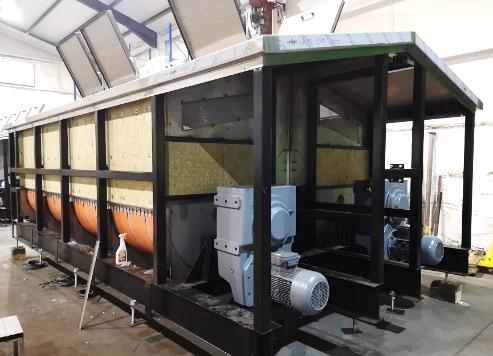
The Case for Composting in High-Volume Food Service Operations
High-volume foodservice operations have a huge responsibility in contributing to the nation’s food waste. Without a food composter, recycling program, and waste reduction plan in place, restaurants, and grocery stores can waste high volumes of perfectly usable food. Let these statistics sink in:
- Californians throw away nearly 6 million tons of food scraps or food waste each year. This represents about 18 percent of all the material that goes to landfills.
- Across the U.S., consumers, businesses, and farms spend $218 billion annually on food that is never eaten. (By the way, nearly 40% of food in the United States goes uneaten.)
- 84.3% of unused food in American restaurants ends up as trash, while 14.3% is recycled, and 1.4% is donated.
Food waste is about so much more than what goes into the garbage. It takes a lot of resources to move food from farm to fork—energy, land, water, and labor. So much more than food gets wasted in the process of growing, packaging, transporting, and distributing it.
The Environmental Impact of Food Waste Is Devastating
When food waste goes to a landfill, it decomposes and releases methane. Organic waste decomposition in landfills has been identified as a major contributor to greenhouse gas emissions that contribute to global climate change.
Growing all of that food just for it to rot in a landfill is also a waste of precious water. According to moveforhunger.org, farmers use a volume of water roughly three times the volume of Lake Geneva just to produce food that is not eaten.
High-Volume Food Service Operations Can Improve Practices
High-volume foodservice operations are responsible for a huge percentage of the nation’s food waste. Given the environmental crisis, that also means these operations have a huge responsibility to reduce wasted food before it reaches consumers’ plates – and have a food composter and composting system for food that would otherwise leave the restaurant as waste.
Food Composting Benefits Restaurants and Grocery Stores By…
- Reducing the amount of waste these companies send to landfills. This means less space taken up by food waste in landfills and fewer methane emissions produced as a result of food decomposition and decay.
- Increasing their bottom line: Food composting reduces the number of trash pickups businesses need, which lowers their monthly bill.
- Building a more sustainable business: Food composting is good for the environment and can help build a brand that customers want to support.
- Generates a source of income: Restaurants and grocery stores that compost their food scraps can sell the finished compost to local farmers or gardeners.
- Helping others in need: Restaurants and grocery stores can donate their leftover food (and even their compostable materials) to local shelters, churches, or food banks. In this way, they are helping to feed those who might not have access to food otherwise.
Should Foodservice Operations Invest in a Food Composter?
The answer is a resounding yes! High-volume foodservice operations can and should invest in a food composter or dehydrator for several reasons.
Dehydrators
Dehydrators are food waste reduction systems that can reduce weight and volume by as much as 90% These simple automated systems use heat and mechanical mixing to dry food and other organic waste.
Our Gaia Food Waste Dryer and Harp Renewable Dehydrators are powerful tools for achieving zero-waste: As organic and food wastes have a high moisture content (up to 98%), the machine achieves weight and volume reduction by evaporating the water, resulting in a dry, manageable and sterile end product that will remain stable for many weeks without deteriorating. This organic waste powder has a significant calorific value as biomass fuel or quality feedstock.
Benefits
- Reduces waste disposal and transportation frequency and cost
- Simple and robust automated batch drying system
- Reduce odors and vermin attraction
- Range of sizes from 30 kg up to 200 tons/day
- Accepts many contaminated and packaged food wastes
- Enables conversion of food waste to Biomass and recovery of recyclable packaging
Bio-Digesters Make Better Compost
Conventional composting is a great way to reduce organic waste, but relying on natural decomposition has its limitations. For one, it can take weeks or even months for the process to be completed. And while the end product is a healthy addition to soil, it still contains many of the original pathogens and weed seeds that were present in the raw organic waste. Our food composter Harp’s Accelerated Bio Digester, on the other hand, uses a combination of heat, enzymes, and microbes to achieve viable compost in just 24 hours – ensuring a rapid, complete, and total breakdown of organic waste.
The end result? A dry, odorless, nutrient-dense, pathogen-free organic fertilizer that improves soil porosity, increases water absorption and retention, improves the bioavailability of nutrients for plants – and doesn’t create any landfill waste to boot!
Liquid Food Composters
A liquid food composter machine can be thought of as a bio-digester in which microorganisms are digesting the organic material. These machines significantly reduce the food waste and carbon footprint of a business.
Our Power Knot liquid food composter is a fully enclosed automatic composting machine that disposes of food matter within 24 hours. Once installed, you can add waste food at any time and only decomposed food is discharged into the wastewater.
Benefits
- Greatly reduces time, labor, and cost to dispose of waste food
- Reduces size, quantity, and smells of trash bins
- Eliminates flies and rodents that may be attracted to garbage bins containing waste food
- Waste food does not go to landfills where it creates methane, plus the machine can report the CO2 equivalent diverted from a landfill
- The ROI (return on investment) is typically 6 to 24 months
Other Ways to Reduce Food Waste in High-Volume Operations
High-volume foodservice operations should embed food waste reduction into their company culture.
In training: Encourage staff to identify ways food waste can be reduced throughout the business from farm to fork.
At the farm: Buy imperfect produce that would otherwise go unsold (brown bananas, misshapen fruit). Request smaller quantities of perishable products so less food goes to waste.
At the grocery store: Buy overstock items near their expiration date so they don’t go bad before being sold.
At the table: Offer customers smaller portions, or make larger items available in half portions. Give customers a choice of whether they would like to take leftovers with them.
Unique Food Waste and Compost Tools at BATC
We have a wide selection of trash compactors, balers, and food composters that can significantly reduce the volume of food waste your company sends to a landfill every year. Use our proven 450ss, V95, or SV2 to compact coffee cups, paper plates, pizza boxes, compostable plastic ware, and more all to reduce volume and save on hauling costs. Furthermore, our point of generation balers (B5, X6030) bale shrink-wrap and keep cardboard out of the waste stream.
If you are a large generator of organic material in California, it is time for action! Give us a call today at (833) 562-0665.
Contents
- The Environmental Impact of Food Waste Is Devastating
- High-Volume Food Service Operations Can Improve Practices
- Food Composting Benefits Restaurants and Grocery Stores By…
- Should Foodservice Operations Invest in a Food Composter?
- Other Ways to Reduce Food Waste in High-Volume Operations
- Unique Food Waste and Compost Tools at BATC
